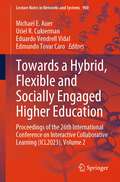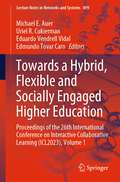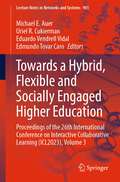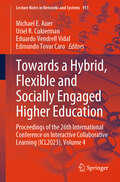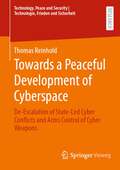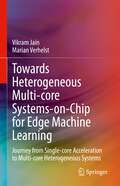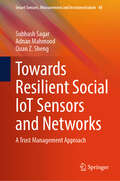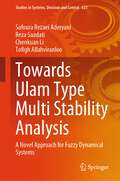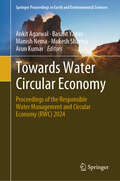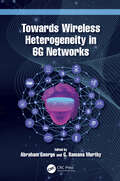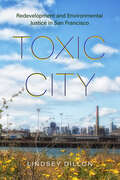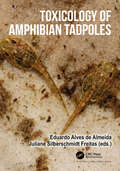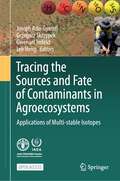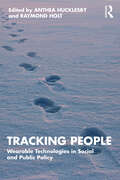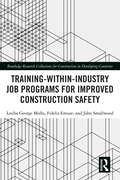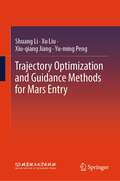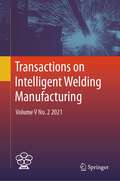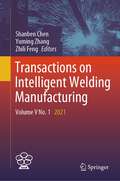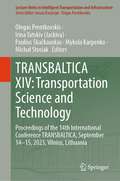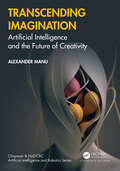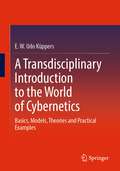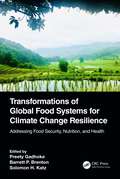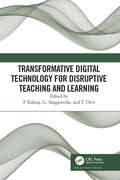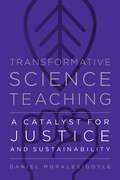- Table View
- List View
Towards a Hybrid, Flexible and Socially Engaged Higher Education: Proceedings of the 26th International Conference on Interactive Collaborative Learning (ICL2023), Volume 2 (Lecture Notes in Networks and Systems #900)
by Michael E. Auer Uriel R. Cukierman Eduardo Vendrell Vidal Edmundo Tovar CaroThis book contains papers in the fields of educational virtual environments, future of education, project-based learning (PBL), and digital education strategy and engineering pedagogy. The authors currently witnessing a significant transformation in the development of education on all levels and especially in post-secondary education. To face these challenges, higher education must find innovative and effective ways to respond in a proper way. The pandemic period left us with profound changes in the way we teach and learn, including the massive use of new means of communication, such as videoconferencing and other technological tools. Moreover, the current explosion of artificial intelligence tools, mainly used by students, is challenging teaching practices maintained for centuries. Scientifically based statements as well as excellent best practice examples are absolutely necessary. The 26th International Conference on Interactive Collaborative Learning (ICL2023), which took place in Madrid, Spain, between September 26 and 30, 2023, was the perfect place where current trends in higher education were presented and discussed. Since its beginning in 1998, this conference has been devoted to new approaches in learning with a focus on collaborative learning in higher education. Nowadays, the ICL conferences are a forum of the exchange of relevant trends and research results as well as the presentation of practical experiences in learning and engineering pedagogy. In this way, the authors try to bridge the gap between ‘pure’ scientific research and the everyday work of educators. Interested readership includes policy makers, academics, educators, researchers in pedagogy and learning theory, schoolteachers, learning industry, further and continuing education lecturers, etc.
Towards a Hybrid, Flexible and Socially Engaged Higher Education: Proceedings of the 26th International Conference on Interactive Collaborative Learning (ICL2023), Volume 1 (Lecture Notes in Networks and Systems #899)
by Michael E. Auer Uriel R. Cukierman Eduardo Vendrell Vidal Edmundo Tovar CaroThis book contains papers in the fields of collaborative learning, digital transition in education, and AI and learning analytics in engineering education. The authors are currently witnessing a significant transformation in the development of education on all levels and especially in post-secondary education. To face these challenges, higher education must find innovative and effective ways to respond in a proper way. The pandemic period left us with profound changes in the way we teach and learn, including the massive use of new means of communication, such as videoconferencing and other technological tools. Moreover, the current explosion of artificial intelligence tools, mainly used by students, is challenging teaching practices maintained for centuries. Scientifically based statements as well as excellent best practice examples are absolutely necessary. The 26th International Conference on Interactive Collaborative Learning (ICL2023), which took place in Madrid, Spain, between September 26 and 30, 2023, was the perfect place where current trends in higher education were presented and discussed. Since its beginning in 1998, this conference has been devoted to new approaches in learning with a focus on collaborative learning in higher education. Nowadays, the ICL conferences are a forum of the exchange of relevant trends and research results as well as the presentation of practical experiences in learning and engineering pedagogy. In this way, the authors try to bridge the gap between ‘pure’ scientific research and the everyday work of educators. Interested readership includes policy makers, academics, educators, researchers in pedagogy and learning theory, schoolteachers, learning industry, further and continuing education lecturers, etc.
Towards a Hybrid, Flexible and Socially Engaged Higher Education: Proceedings of the 26th International Conference on Interactive Collaborative Learning (ICL2023), Volume 3 (Lecture Notes in Networks and Systems #901)
by Michael E. Auer Uriel R. Cukierman Eduardo Vendrell Vidal Edmundo Tovar CaroThis book contains papers in the fields of engineering pedagogy education, research in engineering pedagogy, and games in engineering education. The authors are currently witnessing a significant transformation in the development of education on all levels and especially in post-secondary education. To face these challenges, higher education must find innovative and effective ways to respond in a proper way. The pandemic period left us with profound changes in the way we teach and learn, including the massive use of new means of communication, such as videoconferencing and other technological tools. Moreover, the current explosion of artificial intelligence tools, mainly used by students, is challenging teaching practices maintained for centuries. Scientifically based statements as well as excellent best practice examples are absolutely necessary. The 26th International Conference on Interactive Collaborative Learning (ICL2023), which took place in Madrid, Spain, between September 26 and 30, 2023, was the perfect place where current trends in higher education were presented and discussed. Since its beginning in 1998, this conference has been devoted to new approaches in learning with a focus on collaborative learning in higher education. Nowadays, the ICL conferences are a forum of the exchange of relevant trends and research results as well as the presentation of practical experiences in learning and engineering pedagogy. In this way, the authors try to bridge the gap between ‘pure’ scientific research and the everyday work of educators. Interested readership includes policy makers, academics, educators, researchers in pedagogy and learning theory, schoolteachers, learning industry, further and continuing education lecturers, etc.
Towards a Hybrid, Flexible and Socially Engaged Higher Education: Proceedings of the 26th International Conference on Interactive Collaborative Learning (ICL2023), Volume 4 (Lecture Notes in Networks and Systems #911)
by Michael E. Auer Uriel R. Cukierman Eduardo Vendrell Vidal Edmundo Tovar CaroWe are currently witnessing a significant transformation in the development of education on all levels and especially in post-secondary education. To face these challenges, higher education must find innovative and effective ways to respond in a proper way. The pandemic period left us with profound changes in the way we teach and learn, including the massive use of new means of communication, such as videoconferencing and other technological tools. Moreover, the current explosion of artificial intelligence tools, mainly used by students, is challenging teaching practices maintained for centuries. Scientifically based statements as well as excellent best practice examples are absolutely necessary.The 26th International Conference on Interactive Collaborative Learning (ICL2023), which will take place in Madrid, Spain, between 26th and 30th September 2023, will be the perfect place where to present and discuss current trends in Higher Education.Since its beginning in 1998 this conference is devoted to new approaches in learning with a focus on collaborative learning in Higher Education. Nowadays the ICL conferences are a forum of the exchange of relevant trends and research results as well as the presentation of practical experiences in Learning and Engineering Pedagogy. In this way we try to bridge the gap between ‘pure’ scientific research and the everyday work of educators.
Towards a Peaceful Development of Cyberspace: De-Escalation of State-Led Cyber Conflicts and Arms Control of Cyber Weapons (Technology, Peace and Security I Technologie, Frieden und Sicherheit)
by Thomas ReinholdThe cyberspace and its global infrastructures are essential for our civilizations, the economy and administration. However, cyberspace is also increasingly developing into an intelligence and military operational area, visible in the creation of military cyber departments and the integration of cyberspace into states' security and defense strategies. Unfortunately, many of the established toolset of transparency, de-escalation and arms control measures do not work for cyberspace due to its specific technical characteristics. But how de-escalation of state-led conflicts in cyberspace can be achieved and how arms control of cyber weapons can be developed? Based on a technical perspective with regard to the underlying political challenges, the book follows an approach of adopting already existing technical measures from other fields of the computer science. It presents a classification system for cyberweapons, an approach for the mutual reduction of vulnerability stockpiles and provides an approach to prove the non-involvement in a cyber conflict. Beyond this, it aims to provide some impulses regarding the responsibility and creative options of the computer science with a view to the peaceful development and use of cyberspace.
Towards Heterogeneous Multi-core Systems-on-Chip for Edge Machine Learning: Journey from Single-core Acceleration to Multi-core Heterogeneous Systems
by Vikram Jain Marian VerhelstThis book explores and motivates the need for building homogeneous and heterogeneous multi-core systems for machine learning to enable flexibility and energy-efficiency. Coverage focuses on a key aspect of the challenges of (extreme-)edge-computing, i.e., design of energy-efficient and flexible hardware architectures, and hardware-software co-optimization strategies to enable early design space exploration of hardware architectures. The authors investigate possible design solutions for building single-core specialized hardware accelerators for machine learning and motivates the need for building homogeneous and heterogeneous multi-core systems to enable flexibility and energy-efficiency. The advantages of scaling to heterogeneous multi-core systems are shown through the implementation of multiple test chips and architectural optimizations.
Towards Resilient Social IoT Sensors and Networks: A Trust Management Approach (Smart Sensors, Measurement and Instrumentation #48)
by Quan Z. Sheng Adnan Mahmood Subhash SagarThis book, at first, explores the evolution of the IoT to SIoT and offers a comprehensive understanding of SIoT and trust management vis-à-vis SIoT. It subsequently envisages trust quantification models by employing key SIoT-specific trust features, including SIoT relationships (e.g., friendships, working relationships, and community-of-interest), direct observations, and indirect observations, to augment the idea of trust quantification of a SIoT object. Furthermore, diverse trust aggregation techniques, i.e., conventional weighted sum, machine learning, and artificial neural networks, are proposed so as to address the challenges of the trust aggregation. Finally, the book outlines the future research directions for emphasizing the importance of trustworthiness management in the evolving notion of the SIoT.
Towards Ulam Type Multi Stability Analysis: A Novel Approach for Fuzzy Dynamical Systems (Studies in Systems, Decision and Control #523)
by Reza Saadati Tofigh Allahviranloo Safoura Rezaei Aderyani Chenkuan LiThe main target of this book is to present a new concept of Ulam-type stability, i.e., multi-stability, through the classical, well-known special functions and to obtain the best approximation error estimates by a different concept of perturbation stability including fuzzy approaches for uncertainty considerations. This stability allows us to obtain diverse approximations depending on various special functions that are initially chosen and to evaluate maximal stability and minimal error which enable us to obtain a unique optimal solution of functional equations, inequalities, and fractional equations. Stability analysis in the sense of the Ulam and its different kinds has received considerable attention from the researchers. However, how to effectively generalize the Ulam stability problems and to evaluate optimized controllability and stability are new issues. The multi-stability not only covers the previous concepts but also considers the optimization of the problem and provides a comprehensive discussion of optimizing the different types of the Ulam stabilities of mathematical models used in the natural sciences and engineering disciplines with fuzzy attitudes. Besides, this book also deals with nonlinear differential equations with various boundary conditions or initial value problems, based on the matrix Mittag-Leffler function, fixed point theory, as well as Babenko's approach to study uniqueness and existence of solutions. In general, the benefits for the readers can be concluded as follows: 1. Evaluates maximal stability with minimal error to get a unique optimal solution. 2. Discusses an optimal method of the alternative to study existence, uniqueness, and different types of Ulam stabilities under special consideration of the fuzzy approaches. 3. Delves into the new study of boundary value problems of fractional integro-differential equations with integral boundary conditions and variable coefficients.
Towards Water Circular Economy: Proceedings of the Responsible Water Management and Circular Economy (RWC) 2024 (Springer Proceedings in Earth and Environmental Sciences)
by Mukesh Sharma Arun Kumar Basant Yadav Ankit Agarwal Manish NemaResponsible water management and circular economy aims to establish a common understanding of circular economy principles and resilience in the water sector and to support countries in the implementing those principles. It is essential for water security to deal with the effect of climate change. It can be achieved through smart water management, use of non-conventional water resources, rejuvenation of natural water systems, using advance tools and techniques and adaptation strategies. It will help in improving the water availability in terms of quantity as well as quality and human health. Smart water governance and educating society can also play an important role in achieveing the Sustainable Development Goal (SDG 6) “Water for all“. The book aims to accelerate interaction among various stakeholders.
Towards Wireless Heterogeneity in 6G Networks
by Abraham George G. Ramana MurthyThe connected world paradigm effectuated through the proliferation of mobile devices, Internet of Things (IoT), and the metaverse will offer novel services in the coming years that need anytime, anywhere, high-speed access. The success of this paradigm will highly depend on the ability of the devices to always obtain the optimal network connectivity for an application and on the seamless mobility of the devices. This book will discuss 6G concepts and architectures to support next-generation applications such as IoT, multiband devices, and high-speed mobile applications. IoT applications put forth significant challenges on the network in terms of spectrum utilization, latency, energy efficiency, large number of users, and supporting different application characteristics in terms of reliability, data rate, and latency.While the 5G network developmentwas motivated by the need for larger bandwidth and higher quality of service (QoS), 6G considerations are supporting many users with a wide application requirement, lowering network operating cost, and enhanced network flexibility. Network generations beyond 5G are expected to accommodate massive number of devices with the proliferation of connected devices concept in connected cars, industrial automation, medical devices, and consumer devices.This book will address the fundamental design consideration for 6G networks and beyond. There are many technical challenges that need to be explored in the next generation of networks, such as increased spectrum utilization, lower latency, higher data rates, accommodating more users, heterogeneous wireless connectivity, distributed algorithms, and device-centric connectivity due to diversified mobile environments and IoT application characteristics. Since 6G is a multidisciplinary topic, this book will primarily focus on aspects of device characteristics, wireless heterogeneity, traffic engineering, device-centric connectivity, and smartness of application.
Toxic City: Redevelopment and Environmental Justice in San Francisco
by Lindsey DillonToxic City presents a novel critique of postindustrial green gentrification through a study of Bayview-Hunters Point, a historically Black neighborhood in San Francisco. As cities across the United States clean up and transform contaminated waterfronts and abandoned factories into inviting spaces of urban nature and green living, working-class residents—who previously lived with the effects of state abandonment, corporate divestment, and industrial pollution—are threatened with displacement at the very moment these neighborhoods are cleaned, greened, and revitalized. Lindsey Dillon details how residents of Bayview-Hunters Point have fought for years for toxic cleanup and urban redevelopment to be a reparative process and how their efforts are linked to long-standing struggles for Black community control and self-determination. She argues that environmental racism is part of a long history of harm linked to slavery and its afterlives and concludes that environmental justice can be conceived within a larger project of reparations.
Toxicology of Amphibian Tadpoles
by Eduardo Alves de Almeida Juliane Silberschmidt FreitasAnuran amphibians are among the animal groups with the highest rate of population decline on the planet. Among the factors driving this decline are environmental pollutants, whose negative effects on larvae and tadpoles are still relatively little studied. This is the first book devoted entirely to studying the effects of environmental pollutants on amphibian tadpoles. Throughout its 14 chapters, various aspects of the toxic effects of different classes of environmental contaminants are explored, such as the toxicokinetics of toxic compounds in tadpoles and their health effects, which may result in negative consequences at populations level.
Tracing the Sources and Fate of Contaminants in Agroecosystems: Applications of Multi-stable Isotopes
by Lee Heng Joseph Adu-Gyamfi Grzegorz Skrzypek Gwenaël ImfeldThe objective of this open access book is to present protocols, methodologies, and standard operating procedures (SOPs) used for the identification of sources, transport, and fate of agro-contaminants and illustrate them with several case studies of successful applications. The Soil and Water Management & Crop Nutrition (SWMCN) Subprogramme of the Joint Food and Agriculture Organization (FAO)/International Atomic Energy Agency (IAEA) Centre of Nuclear Techniques in Food and Agriculture, through a Coordinated Research Project (CRP) in partnership with national and international research institutes, developed and evaluated a set of analytical techniques (the toolbox). The toolbox integrates multiple isotope tracers that provide information on the origins and pathways of multiple pollutants through agro-ecosystems, thereby providing more accurate guidance on mitigations. However, land management strategies to address and control the transport of pollutants from soil to water bodies remain the shared responsibility of farm and aquaculture operators, agro-chemical manufacturers, and policymakers in food and agriculture as well as the mining sectors. This book is structured into eight chapters covering (i) an overview of the book’s content, (ii) guidelines for designing water sampling programmes, (iii) the use of mixing models applicable to tracers for water pollution studies, (iv) compound-specific isotope analyses to investigate pesticide degradation in agricultural catchments, (v) the use of stable oxygen isotope composition of phosphate to investigate phosphorous in soil-plant continuum, (vi) the use of stable sulphur isotopes to disentangle agro-pollutants from other contaminants, (vii) nuclear tools used in sediment source apportionment, and (viii) the conclusions and perspectives forward. The book offers up-to-date information, and we hope it is a great source of information for students, researchers, and policymakers. The SWMCN subprogramme thanks all the contributors involved in the preparation of this publication.
Tracking People: Wearable Technologies in Social and Public Policy
by Raymond HoltTracking technologies are now ubiquitous and are part of many people’s everyday lives. Large sections of the population voluntarily use devices and apps to track fitness, medical conditions, sleep, vital signs or their own or others’ whereabouts. Governments, health services, immigration and criminal justice agencies increasingly rely upon tracking technologies to monitor individuals’ whereabouts, behaviour, medical conditions and interventions. Despite the human rights concerns of some organisations and individuals, most wearers and their significant others tend to welcome the technologies. This paradox is only one of the many fascinating challenges raised by the widespread use of tracking technologies which are explored in this book. This book critically explores the ethical, legal, social, and technical issues arising from the current and future use of tracking technologies. It provides a unique and wide-ranging discussion, via a cross-disciplinary collection of essays, on issues relating to technological devices and apps whose use is imposed upon wearers or suggested by others, whether agencies or individuals, including in the domains of criminal justice, terrorism, and health and social care. Contributions from leading academics from across social sciences, engineering, computer and data science, philosophy, and health and social care address the diverse uses of tracking technologies including with individuals with dementia, defendants and offenders, individuals with mental health conditions and drug users alongside legal, ethical and normative questions about the appropriate use of these technologies. Cross-disciplinary themes emerge focusing on both the benefits of the technologies – freedom, improved safety, security, well-being and autonomy, and increased capacity of and efficiencies for public services – and the challenges – implementation and operational costs, mission creep, privacy concerns, stigmatisation, whether the technologies work as expected, and useability and wearability for all wearers. This book is essential reading for academics and students engaged in criminology, criminal justice, socio-legal studies, science and technology studies, medicine, health and social care, psychology, engineering, computer and data science, philosophy, social policy and social work and security studies. It will also be of great interest to policy-makers, regulators, practitioners already deploying or considering using tracking technologies, and to current and potential wearers.
Training-Within-Industry Job Programs for Improved Construction Safety (Routledge Research Collections for Construction in Developing Countries)
by Lesiba George Mollo Fidelis Emuze John SmallwoodThe purpose of this book is to demonstrate how a Training-Within-Industry (TWI) Job-Program could reduce human factor-related harm in construction. The construction industry has a significant impact on issues relating to the health, safety, and well-being (HSW) of people in the workforce. It is important to acknowledge that workers' behaviour influences the safety management system (SMS) of construction projects either negatively or positively and that it is important for a management team to identify relevant behaviours and take appropriate action to solve problems. In most cases, accidents happen because of the results of human failure in the form of errors, violations and system failures. Human failure causes accidents and site management needs to reduce hazards that might cause such errors, violations and system failures on worksites. The chapters in the book address factors causing human failure on construction sites, how to mitigate errors and violations through SMS and ‘learning by doing’ and improving practice of using safety instructors on sites. The book closes with insights from a TWI-informed human failure reduction framework. This book provides valuable insights into safety management in a construction site context that can be applied to other areas. It is essential reading for safety managers, construction managers, researchers, and advanced students.
Trajectory Optimization and Guidance Methods for Mars Entry
by Shuang Li Xu Liu Xiu-qiang Jiang Yu-ming PengThis book systematically investigates the Mars entry problem from the perspectives of deterministic optimization, uncertainty optimization, and guidance. Began with a detailed review of the robotic missions and human-scaled exploration plans to Mars, theories or concepts of optimal control, uncertainty quantification, robust optimization, model predictive control, sequential convex programming, and computational guidance are subsequently introduced. Correspondingly, this book presents a series of trajectory planning and guidance algorithms to improve the robustness, reliability, and safety of the Mars missions. Because the Mars entry problem is studied using advanced mathematics, including probability theory, optimization theory, and cybernetics, thus the book is primarily designed as a textbook for graduate students in aerospace engineering, aeronautics, and astronautics departments. Engineers and researchers may also use this book as a reference or tutorial to help with the modeling and simulation of the Mars entry problem due to its thorough simulations and analyses.
Transactions on Intelligent Welding Manufacturing: Volume V No. 2 2021 (Transactions on Intelligent Welding Manufacturing)
by Shanben Chen Yuming Zhang Zhili FengThe primary aim of this volume is to provide researchers and engineers from both academic and industry with up-to-date coverage of new results in the field of robotic welding, intelligent systems and automation. The book is mainly based on papers selected from the 2022 International Conference on Robotic Welding, Intelligence and Automation (RWIA’2022) in Shanghai and Lanzhou, China. The articles show that the intelligentized welding manufacturing (IWM) is becoming an inevitable trend with the intelligentized robotic welding as the key technology. The volume is divided into four logical parts: Intelligent Techniques for Robotic Welding, Sensing of Arc Welding Processing, Modeling and Intelligent Control of Welding Processing, as well as Intelligent Control and its Applications in Engineering.
Transactions on Intelligent Welding Manufacturing: Volume V No. 1 2021 (Transactions on Intelligent Welding Manufacturing)
by Shanben Chen Yuming Zhang Zhili FengThe primary aim of this book is to provide researchers and engineers from both academic and industry with up-to-date coverage of new results in the field of robotic welding, intelligent systems and automation. The book is mainly based on papers selected from the 2022 International Conference on Robotic Welding, Intelligence and Automation (RWIA’2022) in Shanghai and Lanzhou, China. The articles show that the intelligentized welding manufacturing (IWM) is becoming an inevitable trend with the intelligentized robotic welding as the key technology. The volume is divided into four logical parts: Intelligent Techniques for Robotic Welding, Sensing of Arc Welding Processing, Modeling and Intelligent Control of Welding Processing, as well as Intelligent Control and its Applications in Engineering.
TRANSBALTICA XIV: Proceedings of the 14th International Conference TRANSBALTICA, September 14-15, 2023, Vilnius, Lithuania (Lecture Notes in Intelligent Transportation and Infrastructure)
by Olegas Prentkovskis Irina Yatskiv Paulius Skačkauskas Mykola Karpenko Michał StosiakThis book reports on innovative research and developments in the broad field of transportation. It covers innovative solutions relating to intelligent vehicles and infrastructure, energy and combustion management, vehicle dynamics and engineering. It also reports on advances in railway transport, air transportation, as well as transportation safety and logistics. Chapters are based on peer-reviewed papers presented at the 14th international scientific conference "Transbaltica: Transportation Science and Technology", held on September 14-15, 2023, at Vilnius Gediminas Technical University, in Vilnius, Lithuania. All in all, this book offers extensive and timely information to both researchers and practitioners in the field of transportation, logistics and related interdisciplinary areas.
Transcending Imagination: Artificial Intelligence and the Future of Creativity (Chapman & Hall/CRC Artificial Intelligence and Robotics Series)
by Alexander ManuImagine a world where the boundaries of creativity are not only stretched but redefined. This book serves as your guide to this new frontier, engaging general readers, tech enthusiasts, and creatives alike in the captivating interplay between human ingenuity and artificial intelligence (AI).Journey through the ground-breaking advancements in AI as they intersect with art, design, entertainment, and education. Discover how AI’s power to analyze and understand language can be harnessed to generate breathtaking visuals from mere text descriptions—a process known as text-conditional image generation. But this book goes beyond just showcasing AI’s capabilities: it delves into its transformative effects on the creative process itself. How will artists and designers adapt to a world where they co-create with machines? What are the implications of AI-generated art in educational settings? This book tackles these questions head on, offering a comprehensive view of the changing landscape of creativity.At its core, this book challenges you to rethink what’s possible in the realm of artistic expression. Manu contends that as AI evolves, mastering the art of collaboration between human and machine will become essential. More than just a look into the future, Transcending Imagination: Artificial Intelligence and the Future of Creativity is a roadmap for artists, designers, and educators eager to navigate the uncharted territory of AI-augmented creativity. It is a must-read for anyone interested in how AI might redefine the realms of art, design, and education.
A Transdisciplinary Introduction to the World of Cybernetics: Basics, Models, Theories and Practical Examples
by E. W. KüppersThis introduction to the world of cybernetics provides the basics and discusses the most important thought leaders, models as well as theories. Practical examples from the fields of biology, ecology, technology, society, and politics are used to illustrate the theoretical material. Questions at the end of the chapters stimulate reflection, and the author does not owe the answers. A central theme in all cybernetic considerations and a guiding theme of the book are information exchange and communication.
Transformation der hydrostatischen Antriebstechnik zur E-Mobilität
by Wolfgang WiestDieses Lehr- und Fachbuch dient als Leitfaden für die Transformation zur Projektierung von E-Mobilitätssystemen als Substitution von hydrostatischen Antriebssystemen im Kontext der E-Mobilität. Es zeigt auf, welche Rahmenbedingungen bei der Transformation vorhanden sein und beachtet werden müssen und welche zusätzlichen technischen Potentiale im Vergleich zu den bisherigen hydraulischen Antriebsstrukturen nutzbar sind. Da zukünftig beide Systeme erforderlich sind, kommt einer Plattformstruktur besondere Bedeutung zu. In diesem Buch werden entsprechende Optionen dargestellt und erläutert. Zielgruppe sind Studierende an den Technischen Hochschulen und Universitäten aber auch Mitarbeitende in Konstruktions- und Entwicklungsabteilungen der Fahrzeugindustrie.
Transformations of Global Food Systems for Climate Change Resilience: Addressing Food Security, Nutrition, and Health
by Preety Gadhoke Barrett P. Brenton Solomon H. KatzTransformations of Global Food Systems for Climate Change Resilience: Addressing Food Security, Nutrition, and Health provides poignant case studies of climate change resilience frameworks for nutrition-focused transformations of agriculture and food systems, food security, food sovereignty, and population health of underserved and marginalized communities from across the globe. Each chapter is drawn from diverse cultural contexts and geographic areas, addressing local challenges of ongoing food and health system transformations and illustrating forms of resistance, resilience, and adaptations of food systems to climate change. Fourteen chapters present global case studies, which directly address the United Nations Sustainable Development Goals and the Food and Agriculture Organization’s global call to action for transforming agriculture, addressing food security and nutrition, and the health of populations impacted by climate change and public health issues.They also integrate reflections, insights, and experiences resulting from the COVID-19 Pandemic. This edited volume includes research on (1) enhancing food sovereignty and food security for underserved populations with a particular focus on indigenous peoples; (2) improving locally contextualized definitions and measurements of climate change resilience, food security, hunger, nutrition, and health; (3) informing public health programs and policies for population health and nutrition; and (4) facilitating public and policy discourse on sustainable futures for community health and nutrition in the face of climate change and natural disasters, including ongoing and future pandemics or emergencies. Within this book, readers discover an array of approaches by the authors that exemplify the mutually engaged and reciprocal partnerships that are community-driven and support the positive transformation of the people with whom they work. By doing so, this book informs and drives a global sustainable future of scholarship and policy that is tied to the intersectionality and synergisms of climate change resilience, food security, food sovereignty, nutrition, and community health.
Transformative Digital Technology for Disruptive Teaching and Learning
by P. Kaliraj G. Singaravelu T. DeviGeneration Z students are avid gamers and are always on social media. Smart like their phones, they must be educated in a smart manner, which involves the use of digital tools. Transformative Digital Technology for Disruptive Teaching and Learning provides smart education solutions and details ways in which Gen Z learners can be educated. It covers such digital learning strategies as blended learning, flipped learning, mobile learning, and gamification. It examines creative teaching–learning strategies to encourage modern learners to learn more quickly. The book discusses ways to accelerate the capabilities of teaching and learning transactions. It also covers innovative teaching and learning processes to meet the challenges of digital learners.Starting with an overview of digital learning resources and processes as well as their advantages and disadvantages, the book then discusses such approaches and strategies as follows: Learner-oriented and learner-friendly approaches Blended learning Active learning Experiential learning Virtual learning Applications of Cloud Computing and Artificial Intelligence Gamification LMS challenges and techno-pedagogical issues for modern life As digital technology is disrupting teaching and learning, especially the skill development of students in the era of Industry 4.0 and 5.0, this is a timely book. It provides methods, approaches, strategies, and techniques for innovative learning and teaching. It discusses how to leverage new technology to enhance educators’ and learners’ abilities and performance. A comprehensive reference guide for educational researchers and technology developers, the book also helps educators embrace the digital transformation of teaching and learning.
Transformative Science Teaching: A Catalyst for Justice and Sustainability
by Daniel Morales-DoyleA call to action championing equity and social justice in K–12 science curriculum
